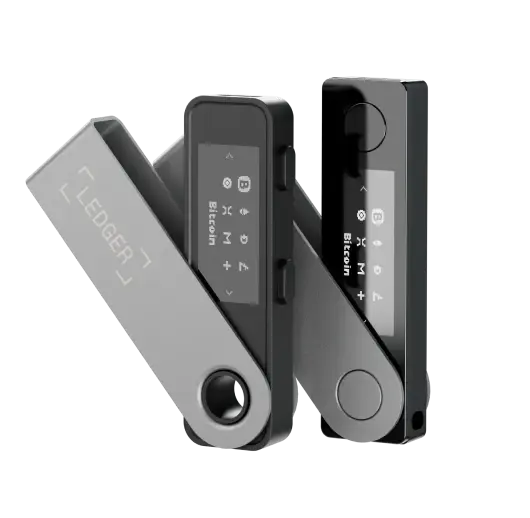Compare Ledger signers
Get a Ledger Nano
Select and purchase a Ledger hardware wallet of your choice.
- Beginner in the crypto world? Get started with Ledger Nano S Plus.
- Prefer a Bluetooth connection? Try with Ledger Nano X.
Looking for a Ethereum Classic Wallet to buy and store your Ethereum Classic? Join 7+ million customers who trust Ledger hardware wallets to securely store their crypto and use them on the day-to-day basis.
Trusted by over 8 million customers

Whether you’re looking to keep your crypto safe for long-term or manage them on a daily basis, Ledger has the right product for you.
Ledger hardware wallet
Ledger hardware wallet stores your private keys and signs transactions offline, making them resistant to malicious attacks and threats. Pair the Ledger crypto wallet with Ledger Live App to manage your Ethereum Classic on the go.
Ledger Live App
Ledger Live App is a gateway to manage your assets, checking your real-time balance, tracking transaction histories, and more.

Select and purchase a Ledger hardware wallet of your choice.

Download and install the Ledger Live app in a couple of clicks on desktop and mobile.
Coupled with a Ledger, it makes the most secured wallet for your Ethereum Classic.

Add a Ethereum Classic account with a couple of clicks. Choose among different providers and easily manage your Ethereum Classic.
And not only Ethereum Classic. With Ledger Live, you can manage thousands of crypto and a large variety of NFTs.

The most premium secure touchscreen hardware wallet to protect and manage your Ethereum Classic.

Designed with accessible sizing, enjoy the all new secure touchscreen user experience to manage your Ethereum Classic.

Our classic entry-level hardware wallets built with all the essentials to secure your Ethereum Classic.

With Ledger Live coupled with a Ledger, you can:
*Buy, send/receive, swap, stake, and other crypto transaction services are provided by third-parties provider, which availability may vary based on jurisdiction/territory.

You can buy Ethereum Classic with a credit/debit card or bank transfer. You can choose from a range of service providers (Paypal, Ramp, MoonPay, Sardine…) and select the option that works best for you.
Your Ethereum Classic will land in your Ledger Ethereum Classic Wallet.

Swapping allows you to explore different crypto assets, protect your Ethereum Classic from volatility, and diversify your portfolio.
You can easily swap Ethereum Classic through Ledger Live without using fiat currencies.

Ethereum Classic (ETC) is a hard fork of Ethereum (ETH) that launched in July 2016. Ethereum Classic is the original Ethereum blockchain. But after a major hacking of DAO that led to the theft of 3.6 million ETH, the Ethereum blockchain has been split in two. Post the split, we got two separate blockchains, one being Ethereum Classic, which follows the same roadmap initially set for Ethereum, and the other being Ethereum, which continues to be developed by the Ethereum Foundation under an updated roadmap.
The main function of Ethereum Classic is to be a decentralized computing platform on top of which smart contracts can be executed, enabling the development of decentralized applications (DApps). Since its launch, Ethereum Classic, the team has sought to differentiate itself from Ethereum, with the two networks’ technical roadmaps diverging further and further from each other with time. They believe that ETC is uniquely positioned as the smart contract platform of the future since it combines the technology of ETH with the philosophy of BTC.
The native token of the Ethereum Classic blockchain is ETC. Similar to Ethereum and its native unit ETH, Ethereum Classic has a maximum supply of 210,700,000 coins. Ethereum Classic users pay fees in ETC to execute smart contracts. These costs are commonly referred to as gas fees, and they are paid to miners who use advanced computers to solve “proof-of-work” problems to help validate the network. The Ethereum Classic blockchain issues new ETC to the circulating supply to reward miners for adding new transactions to the blockchain.
Find answers to some of the most common questions.
Related Resources